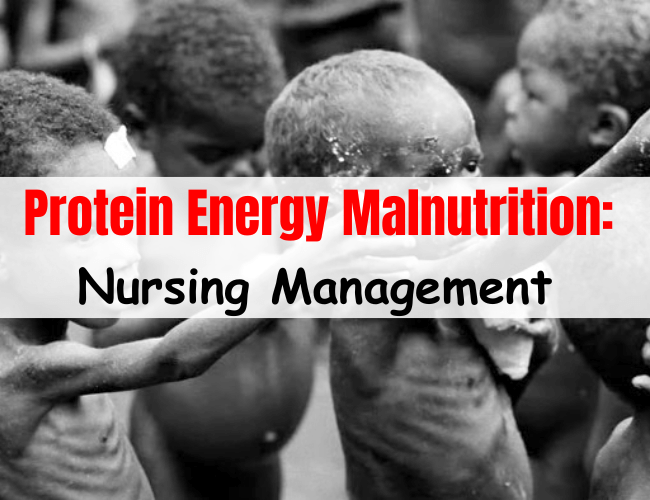Definition of Protein Energy Malnutrition (PEM):
Protein energy malnutrition (PEM) is the kind of malnutrition which results from insufficient intake of energy, protein and other nutrients. Protein-energy malnutrition (PEM) in early childhood is a spectrum of disease. At one end there 1s kwashiorkor, at the other end is nutritional marasmus and in the middle of the spectrum is marasmus kwashiorkor.

Causes and Risk Factors of Protein Energy Malnutrition (PEM):
It includes-
- An inadequate intake of food (food gap) both in quantity and quality.
- Infection: Diarrhea, Respiratory infections, Measles, intestinal worm.
- Large family size.
- Poor environmental conditions.
- Poor maternal health.
- Failure of lactation.
- Premature termination of breast feeding.
- Adverse cultural practices relating to child rearing and wearing, such as
- The use of over-diluted cow’s milk,
- Discarding cooking water from cereals,
- Delayed supplementary feeding.
Nursing Management of Protein Energy Malnutrition (PEM):
Nursing personnel can provide preventive, curative and rehabilitative services to the children with PEM at home and hospital. The nursing responsibilities include the following:
- Assessment of nutritional status of the children with collection of appropriate dietary history, including history of breastfeeding, weaning, food habits, balanced diet, socioeconomic status, presence of illness etc. Physical examination and anthropometric assessment also important to detect the nutritional deficiency states.
- Assisting in diagnostic investigations whenever necessary.
- Maintenance of growth chart by regular health checkup at home, clinic or health centers for early detection of growth failure.
- Participating in the hospital management in complications and life threatening situations related to PEM and other related illness.
- Implementing nutritional rehabilitation activities.
- Encouraging the parents for home care and follow up at regular interval.
- Nutrition education, demonstration and counseling according to identified problems of particular child.
- Informing about breast feeding, weaning, balanced diet, food hygiene, personal hygiene (hand washing), appropriate feeding practices and food habits, cultural taboos, irrational belief, quality of common foods, foods values, food preservations etc.
- Promoting preventive measures for individual, family and community to overcome the problem of PEM.
- Co-operating with other team members and acting with different sectors for the implementation of various nutritional services.
- Maintain in implementation of national nutritional programs for prevention of various malnutrition.
More questions related to this article?
- What do you mean by protein energy malnutrition?
- Define protein energy malnutrition.
- What are the risk factors of protein energy malnutrition?
- Write down the etiological factors of protein energy malnutrition.
- What are the causes of protein energy malnutrition?
- Discuss the nursing responsibilities for the management of protein energy malnutrition.
- Discuss the nursing management of protein energy malnutrition.

Maria Khatun Mona is a Founder and Editor of Nursing Exercise Blog. She is a Nursing and Midwifery Expert. Currently she is working as a Registered Nurse at Evercare Hospital, Dhaka, Bangladesh. She has great passion in writing different articles on Nursing and Midwifery. Mail her at “maria.mona023@gmail.com”
